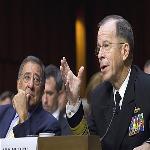South Asian analysts say U.S. frustration with Pakistan may be reaching the breaking point, especially after allegations that militants it supports launched deadly attacks on Americans in Afghanistan.
Heavy fighting broke out at the U.S. embassy in Kabul earlier this month as militants wearing suicide vests and armed with rocket-propelled grenades bombarded the compound.
Days earlier a truck filled with explosives attacked a NATO outpost south of Kabul, wounding 77 coalition troops.
U.S. officials say these and other attacks were launched by the Haqqani network, an ally of the Taliban with strong connections to the Pakistani intelligence agency.
"The Haqqani network, for one, acts as a veritable arm of Pakistan's internal services intelligence agency," said Admiral Mike Mullen, Chairman of the Joint Chiefs. "With ISI support, Haqqani operatives planned and conducted that truck bomb attack, as well as the assault on our embassy."
Those comments from the nation's top military commander have shaken U.S. relations with Pakistan, an ally in the war against terror.
Pakistan has refused to use its troops to attack insurgents from the Haqqani network, based in North Waziristan, a tribal area along the border with Afghanistan. Analysts say Pakistan uses such militant groups to counter the military might and influence of arch rival India.
"Everyone knows that the ISI supports, trains, mans missions, sees both the Afghan Taliban and elements that are allied to it, like the Haqqani network, as their assets," said Christine Fair of Georgetown University. "So there is just this frustration that we have to treat them like an ally, but in fact they are operating against us and our interests."
Following the U.S. commando raid that killed al-Qaida terrorist leader Osama bin Laden, the relationship between Washington and Islamabad soured considerably.
Pakistani officials have denied knowing bin Laden was living comfortably in their country and they deny any involvement in the recent attack on the American embassy in Kabul.
"If you say that it is ISI involved in that attack, I categorically will deny it. I categorically deny it," said Rehman Malik, Pakistani Interior Minister.
U.S. officials say there is credible evidence the Haqqani network also was behind an attack against the Intercontinental Hotel in Kabul last June and many smaller, but effective, operations.
The top commander in Afghanistan is clear about what he thinks needs to be done.
"We seek to have the Pakistani government place greater pressure on the Haqqani network," said General John Allen, Commander International Forces in Afghanistan.
The Pakistani military has refused to go after the Haqqani network and analysts say relations are hitting rock bottom.
"The Pakistanis are really trying to put as much of a wedge between our countries as possible and they are winning. Congress is fed up with them, fed up with them," said Fair.
In the past 10 years, analysts say the United States has provided Pakistan with about $20 billion in military and civilian aid.
With America facing major economic difficulties and its relationship with Pakistan severely frayed, the future of such aid appears to be very much in question.
